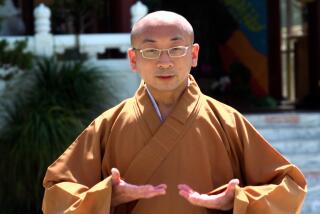Vocabulary refresher course in the language of mindfulness meditation
The vocabulary of meditation can be a barrier for people who feel that they’re entering a strange world, experts say. Here are some common words.
Buddha: meaning one who is awake, in Sanskrit. The Buddha was a person, not a god, who lived more than 2,000 years ago; from a privileged family, he became a seeker of truth and eventually became enlightened.
Dharma: often used to mean the teachings of Buddhism and meditation.
Mantra: a word -- “om” being perhaps the most famous -- repeated as a way to keep the mind focused on one spot during meditation.
Metta: loving kindness. In metta meditation, a person seeks to evoke such feelings for oneself or others independent of self-interest. Phrases such as, “May I be safe, may I be peaceful and happy,” can be repeated in the meditation.
Mindfulness: “a receptive attention to present-moment experience or attention to present-moment experience with a stance of open curiosity” (from Diana Winston of UCLA).
Transcendental meditation: a form of meditation using a mantra, introduced by Maharishi Mahesh Yogi and popularized these days by such people as filmmaker David Lynch.
Vipassana: another name for insight meditation to cultivate mindfulness.
Zafu: a round cushion used for sitting during meditation.
-- Mary MacVean






